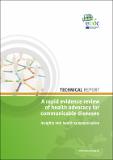| dc.contributor.author | D'Eath, M | |
| dc.contributor.author | Barry, Margaret M. | |
| dc.contributor.author | Sixsmith, J | |
| dc.date.accessioned | 2014-09-29T09:04:12Z | |
| dc.date.available | 2014-09-29T09:04:12Z | |
| dc.date.issued | 2014 | |
| dc.identifier.citation | D Eath, M; Barry, MM; Sixsmith, J (2014) A rapid evidence review of health advocacy for communicable diseases. ECDC, . | en_US |
| dc.identifier.uri | http://www.ecdc.europa.eu/en/publications/Publications/Healthadvocacy- technical-report-January-2014.pdf | |
| dc.identifier.uri | 978-92-9193-491-1 | |
| dc.identifier.uri | http://hdl.handle.net/10379/4587 | |
| dc.description | Report | en_US |
| dc.description.abstract | Advocacy has been identified as a key strategy for health promotion and public health and a powerful tool to
promote equity. In the context of public health, advocacy strives to optimise health by addressing the
environmental, social, political and economic factors that impact on health and seeks to influence the policies and
practices that create the conditions for change [1]. This report is a rapid review of the evidence on public health
advocacy for communicable diseases.
Objectives
This evidence review seeks to examine and encapsulate international evidence on public health advocacy initiatives,
to identify gaps in the evidence, and to provide recommendations.
Findings
No evidence reviews of public health advocacy initiatives for communicable diseases were found in the literature.
However, this review did identify a range of sources of evaluated health advocacy interventions, models and
toolkits, and examples of best practice in the wider health advocacy arena that could be used to inform the
development of effective strategies and resources for communicable disease.
A North American review identified the characteristics of public health advocacy campaigns that were effective in
changing industry practices that damage health [2]. The reviewers identified that most campaigns employed
multiple strategies and that at least half the campaigns used the three strategies of coalition building, media
advocacy and public mobilisation. The importance of the social context to the success of a campaign was
underscored in this review.
Toolkits have been developed by advocacy organisations to provide high quality resources for use by experienced
and novice health advocates. These resources include templates for letters and publicity, advice on engaging the
media and relevant stakeholders, and key messages about the issue of concern. An examination of a number of
these toolkits identified a level of overlap that suggests a common base of core components and principles for
effective advocacy across different topics.
The methodological challenges of evaluating advocacy initiatives provide a forceful argument for adopting a more
considered and systematic approach to evaluation. Recent developments have strengthened the knowledge base
for such evaluations, and the recommended utilisation of a theory of change benefits the development of an
advocacy initiative by making explicit the intended relationship between actions and outcomes.
Conclusions
Health advocacy for communicable diseases is clearly still at a nascent stage and the current evidence base is very
underdeveloped. The duration and complexity of public health advocacy campaigns and initiatives makes the need
for theory-based evidence imperative. The shared consensus in the literature about core components of health
advocacy initiatives and the existence of templates and toolkits in the area means that foundations do exist upon
which to advance advocacy for the prevention of communicable diseases. | en_US |
| dc.format | application/pdf | en_US |
| dc.language.iso | en | en_US |
| dc.publisher | ECDC | en_US |
| dc.rights | Attribution-NonCommercial-NoDerivs 3.0 Ireland | |
| dc.rights.uri | https://creativecommons.org/licenses/by-nc-nd/3.0/ie/ | |
| dc.title | A rapid evidence review of health advocacy for communicable diseases. | en_US |
| dc.type | Report | en_US |
| dc.date.updated | 2014-09-27T16:56:50Z | |
| dc.identifier.doi | 2900/88049 | |
| dc.description.peer-reviewed | non-peer-reviewed | |
| dc.contributor.funder | |~| | |
| dc.internal.rssid | 7297116 | |
| dc.local.contact | Margaret Barry, Ctr For Health Promotion Studies, Room 338a, Aras Moyola, Nui Galway. 3348 Email: margaret.barry@nuigalway.ie | |
| dc.local.copyrightchecked | Yes | |
| dc.local.version | PUBLISHED | |
| nui.item.downloads | 1161 | |


